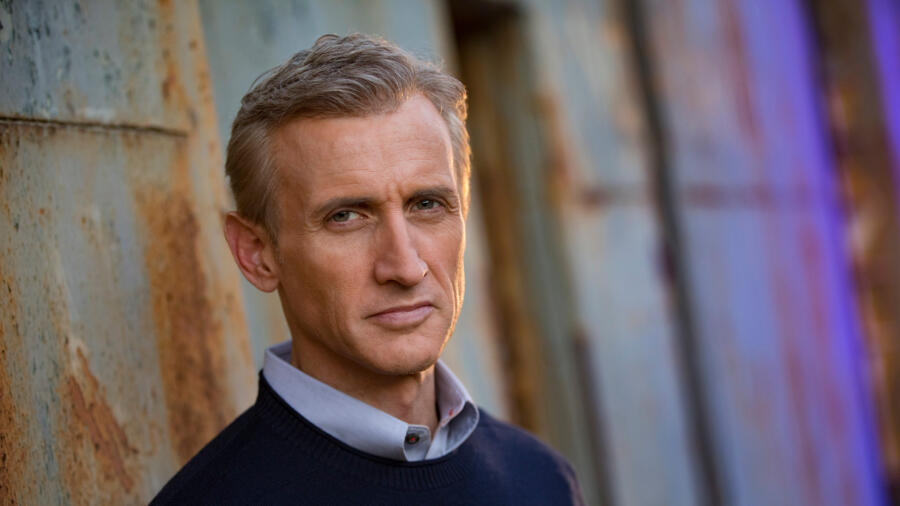When legal analyst and Live PD host Dan Abrams heard a transcript might exist of Abraham Lincoln, arguing a case in court—a murder case no less—he was skeptical. Turns out not only did a transcript exist, but it was the only transcript of a trial Lincoln worked on.
The 16th president was hired as the defense attorney for 22-year-old Simeon “Peachy” Quinn Harrison, charged with murdering Greek Crafton. Harrison’s father, Peyton Harrison, was a longtime friend of Lincoln’s and a loyal supporter. Interestingly, Lincoln was well acquainted with the victim, too. Crafton trained as a law clerk in Lincoln’s office and the future president became his friend and mentor.
Author David Fisher brought the concept to Abrams and they cowrote the book, Lincoln’s Last Trial: The Murder Case That Propelled Him to the Presidency, based on a transcript from 1859 that was discovered in the defendant’s great-grandson’s garage in 1989. The document was found wrapped in a ribbon, in a shoebox.
The story is told through the eyes of Robert Hitt, the trial’s transcriber, who had also documented Lincoln’s debates with Stephen Douglas. At the time, trial transcripts were by no means the norm. In fact, Hitt had been hired by the defendant’s family as a safeguard—they wanted a complete record of the trial in the event they needed to appeal.
A&E True Crime spoke with Abrams about what readers will be surprised to learn about Lincoln and what attorneys and politicians can learn from the former president’s time in the courtroom.
How big a deal was this trial in 1859?
This was a very high-profile local case in the greater Chicago area and in what is often referred to as the West. It was covered by local papers, but Lincoln still wasn’t famous enough, at that point, that the fact that he was the attorney was news in and of itself.
Lincoln had everything to lose by taking this case. There’s no question he was evaluating his options with regard to running for president at this point, and he takes on a case where the ‘community’ as we see today, when someone is indicted, people want justice. Everyone wants convictions! So Lincoln took a big risk.
Tell me about Robert Hitt, the transcriber whose work has kept the story of this trial alive for so long after it ended.
He really was a pioneer in this field. That’s not to suggest that he was the first one to do transcriptions, but he was one of the early ones to figure out how to write shorthand and do it with a steel-tip pen [while] trying to keep up with what they were saying in court.
Who did you find to be the most memorable person you included in the book?
Peter Cartwright, one of the best-known preachers in the country. At the time, he was much more famous than Lincoln. He took on a really fascinating role in this: Not only did he go and counsel the victim before he died, not only did he say that the victim said, ‘I forgive the defendant, I brought this upon myself’—which became a huge issue in terms of should that be admitted in the trial. But he was also the defendant’s grandfather.
And the fact that he wasn’t immediately marginalized just because he was the defendant’s grandfather, the fact that he was so trusted as a source, that it almost became secondary that he was the defendant’s grandfather, is astounding to me.
How did the legal system at that time compare to today?
The lack of precedent in a lot of areas. They were making new law in a lot of areas. And boy, that must have been fun, as attorneys, to be coming up with novel theories and seeing if they would stick, as opposed to only having to base it on precedent.
And the second thing is, just the way the legal system worked there, which is…a traveling group of lawyers and judges who would go from town to town. People would come up and tell them the problems. ‘OK, I’ll take your case. Alright I’ll be the judge here. Let’s get this thing going.’
The legal system was far less formal than it is today, to the point where Lincoln didn’t even go to law school. He got his confirmation he was a person of honor and in good standing.
What modern-day trial would you compare this one to?
I’d compare it to other self-defense cases. There’s no directly analogous case, but it is a pretty straightforward self-defense claim, which is, ‘Yes, I’ve gone and gotten a knife, in preparation for the possible fight we were going to get in, which doesn’t look good. But no, I didn’t pull it out until he attacked me.’ And that’s a classic claim of self-defense: ‘I only stabbed him, I only shot him, because he came at me.’
Is there anything in the book you think will surprise readers about Lincoln?
We have actual quotes from [Lincoln’s] law partner, from the court crier and from others who were there, talking about how angry Lincoln got at the initial ruling.
I don’t think we think of Lincoln as someone who throws temper tantrums. And the image of him literally almost jumping over the bench because he was so angry is sort of startling.
What level of impact did this trial have on what came next for Lincoln?
I think that the public response to this case was probably a reminder to him: I can’t be doing this stuff anymore if I’m going to run for president. I can’t take on controversial cases with controversial defendants. This was the beginning of the end of an enormous chapter in Lincoln’s life.
This case made Lincoln. This is not to suggest he wasn’t known—he’d run for public office before—but I think this helped take him to another level in terms of notoriety. The way the case was covered was an important stepping stone toward the presidency for him.
What traits did you see in Lincoln that more attorneys or politicians could take a lesson from today?
Lincoln said no to cases where he really didn’t believe in the client, and he often didn’t charge people who didn’t have money, who he truly believed in. If more lawyers today were like that, lawyers would have a much better reputation.
Related Features:
Read an Excerpt from ‘Lincoln’ Last Trial: The Murder Case That Propelled Him to the Presidency’
Dan Abrams on the Most Surprising Thing He’s Learned About Cops from Hosting Live PD
Dan Abrams on the ‘Most Disappointing’ Murder Trial Verdict


